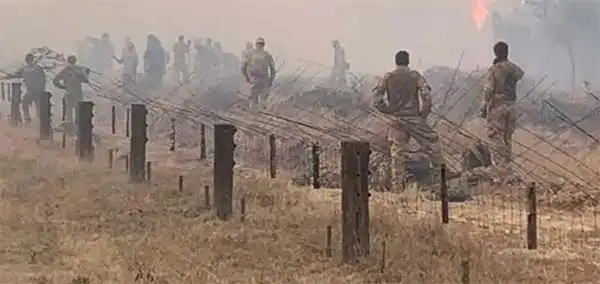Blitz Bureau
The UK Government has agreed to pay compensation to thousands of Kenyans who were affected by a fire caused by a British military training exercise four years ago, reported BBC.
The British army conducts joint exercises with Kenya in the northern Laikipia region, where it has a base in the town of Nanyuki. The fire broke out in the nearby Lolldaiga in March 2021. Residents of Lolldaiga area accused a British army training unit of causing the wildfire that destroyed much of a nature reserve, leaving behind ordnance that injured locals.
The out-of-court settlement follows a lengthy legal battle in which 7,723 claimants said they had lost property and suffered health complications because of the 2021 fire in the Lolldaiga conservancy in Kenya’s Rift Valley. A spokesperson from the British High Commission in Nairobi said the UK “accepts responsibility for the fire and that is why compensation has been paid”, adding “it is the right thing to do”.
“It’s a success story because it’s the first time we’ve ever won a case against the British Army in Kenya but it’s so little it’s almost nothing,” Laikipia County MP Cate Waruguru told CNN. “They feel that their sweat and their struggle have not borne any fruit. We need to see our courts stand up to protect the rights of Kenyans,” she added.
The British Government has not confirmed how much was paid out, but the lawyer in the case told the BBC it was £2.9 million.
The spokesperson from the British High Commission also said the compensation was “generous and fair” and based on a “rigorous assessment of the claims”.
Kevin Kubai called it the “best possible outcome” despite complaints from his clients that the sums they received were much too small to compensate their losses.
He said the alternative “would have been to continue litigation for another period of nearly seven years to be able to prove these cases on a case-bycase analysis”, which would be difficult because much of the evidence had been lost after four years. The UK Ministry of Defence said in 2022 that the fire had likely been caused by a camp stove knocked over during the training exercise in the conservancy. It found that around 7,000 acres (2,800 hectares) of private land were damaged, but no community land was directly affected.
The legal action argued there had been environmental damage in surrounding communities because of the smoke, and the destruction of property because of stampeding wild animals.
































